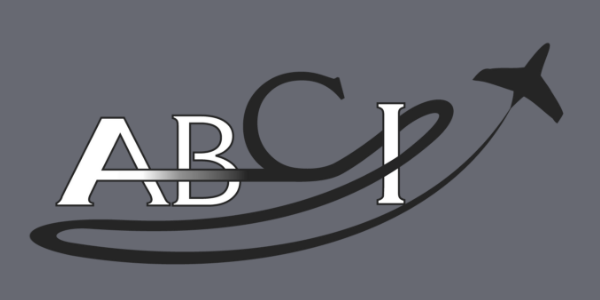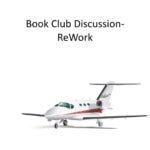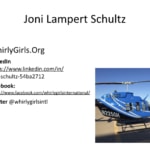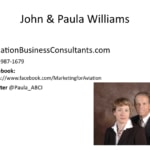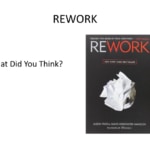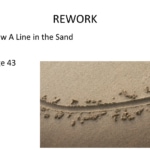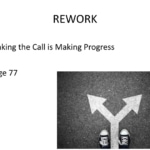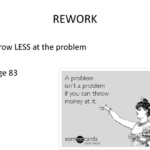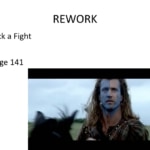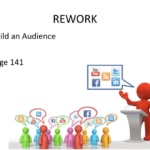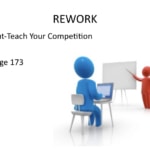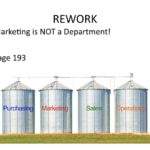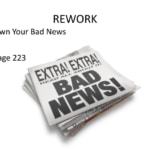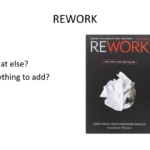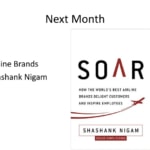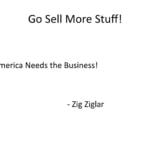John & Paula Williams and Joni Lampert Schultz discuss the book ReWork
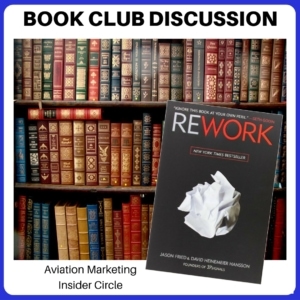 Big ideas from this week’s episode:
Big ideas from this week’s episode:
- The way we’ve traditionally gotten work done has changed.
- Companies like ABCI and nonprofits like the Whirly Girls rely on teams of people all over the country and/or world.
- The way we stay organized, be accountable, and get things done has also changed.
The book has a lot of great tips for doing business in this new environment!
Transcript – Episode 67 – Aviation Marketing Book Club – ReWork”
[MUSIC]Announcer: You’re listening to aviation marketing hanger flying. The community for the best sales and marketing professionals in the aviation industry. You can’t learn to fly just from a book. You learn from other pilots who know the tools, the skills, and the territory. Your hosts, John and Paula Williams, are your sales and marketing test pilots.
They take the risks for you, ensure strategies, relevant examples, hacks and how-tos. Be sure to subscribe on iTunes, so you won’t miss a thing.
Paula Williams: All right, well welcome to the very first book club discussion of 2017. We never really know how these are going to go. We record them live the first Wednesday of each month.
And our insiders are welcome to join us, and we’ll see what happens. So [LAUGH] that’s always fun, right?
John Williams: Yeah.
Paula Williams: This month’s discussion is actually about Rework, which was our December book club selection. And Joni Lampert Schultz and I heard your smiling voice just a minute ago.
Joni and Kasey are our first two recipients of the annual aviation marketing scholarship award. And we’re really happy to have the on board and of course, I’m Paula Williams.
John Williams: And I’m John Williams.
Paula Williams: [LAUGH] And we are ABCI, and we are your moderators for today’s event, and maybe doing most of the talking depending on how this goes, right?
John Williams: [LAUGH] Could be.
Paula Williams: What did you think of the book? This one as actually pretty interesting, because it was written by the folks that built Basecamp, which is our project management software, which is pretty cool. I thought it was pretty neat, because they have some really good ideas about working from anywhere, and most of us are in a situation where we’re not in an office anymore.
We have to work people, that in a lot of cases, we’ve never met in person. We just work with them on the phone, and by email, and by virtually. And I think Basecamp is a nice way of making that work, because you can see what’s been done, what hasn’t been done, what works, what doesn’t work, and so on.
John Williams: Well, we work with people all over the world doing that.
Paula Williams: Exactly.
John Williams: From Panama, to France, to Moscow-.
Paula Williams: Egypt. [LAUGH]
John Williams: All over the states, Egypt at one time, who knows?
Paula Williams: Exactly, so I think Basecamp is really what makes that possible for me, because we can have multiple projects going on.
I can see what needs to be done. I get some pretty good reports on what’s behind, what’s ahead, and so on. I know you’re not a huge fan of Basecamp.
John Williams: No.
Paula Williams: And this is the book that you didn’t get, because this was last month. [LAUGH] You’ll get-
Joni Schultz: : Well, I went out and bought it. And I am so glad I did, because I love it.
Paula Williams: Good.
Joni Schultz: : So, anyway.
Paula Williams: Excellent, well, what did you like about it?
Joni Schultz: : I like the simplicity.
Paula Williams: Uh-huh.
Joni Schultz: : I like that it’s not a lot of jargon, and it just goes right to the point.
Paula Williams: Uh-huh.
Joni Schultz: : That’s what I liked about it. I mean, I specifically, well, I started reading through the whole thing. But then I kinda ran out of time, and so I just kind of went to the points that you said we were going to go over. And I obviously read those, and made some notes, and that sort of thing, so.
Paula Williams: Wow, you are above and beyond, because [LAUGH] we send you the books every month with the bookmarks in them, the things that we’re planning on discussing. And of course, we hope you’ll read the whole book, but yeah, I’m really glad that you went so far above and beyond, and actually went out and got this book ahead of time, and things like that.
That’s wonderful. I liked it. It was not, I’m kind of more of a I guess I like books that are more explanatory of things to do, especially business books, but I did like the fact that this was a nice break from all of the heavy crap I’ve been having on a book rest, and all of the haltoos and everything else.
I think a really nice, refreshing essay-based book. John, I know you probably thought the same. I don’t think you learned anything here that you didn’t already know, but what did you think?
John Williams: They had a few good points, reemphasized points that we already knew.
Paula Williams: That’s true, absolutely.
So, good stuff. So, thing number one that I highlighted for our bookmarks was drawing a line in the sand. I think that is one thing that people, especially in aviation, hesitate to do and say, this is who our product and service is for. And this is who it is maybe not for.
And saying, this is only for people who are, for example, our products and services are only for people who are serious about sales and marketing, and are not the kind of people that think that sales is a bad word, or any of that stuff. So, we don’t I think, make any bones about that.
But I think we could be more clear about that in a lot of our marketing materials.
John Williams: Likely.
Paula Williams: Yeah?
John Williams: Yeah, matter of fact, since we’re going to be working with the website.
Paula Williams: Mm-hm.
John Williams: In other materials, you can be a little more explicit.
Paula Williams: Yeah, include that as one of our main points.
We’re not for everybody, and we don’t want to do business with everybody.
John Williams: No.
Paula Williams: Right, Joanie with the Whirly-Girls, I guess you have a fairly specific profile that you’re going after.
Joni Schultz: : Yes, at the core of the organization, yes, but I guess my take on and kinda what I’ve seen from the organizations since I joined.
And since I’ve been involved in, is that they really aren’t hitting all the potential that I think that they can get.
Paula Williams: Uh-huh.
Joni Schultz: : So, that’s where this really spoke to me, because, first of all, I am kind of opinionated. So, it really spoke to me about how strong opinions aren’t free, because I’ve ruffled some feathers by asking questions, and saying why are we doing that?
Paula Williams: Uh-huh.
Joni Schultz: : Is there a particular reason? And that sort of thing. So, this spoke to me because I said, my strong opinions, they’re not free, and I have upset some people about things. But I feel like I and other people that share what I believe, especially in terms of sponsors, in growing the scholarship program, and not just sticking to the small, what we’ve been doing.
So, we’ve pushed out, that’s the way it’s worked for me.
Paula Williams: Excellent, I like the way you put that.
Joni Schultz: : How can I upset people because I have?
Paula Williams: Right, I like the way you put that though, that opinions aren’t free, there’s always a consequence to expressing a strong opinion, especially disagreeing with someone.
But that doesn’t mean that it’s not worth it, so I think that’s a really great way of putting that.
Joni Schultz: : Absolutely, it’s tough. People all have this problem, we kind of get into the rut of the way we do things. And sometimes it just takes thinking outside the box, and asking, why are we doing this?
Is it just because we’ve always done it this way? Or are we really getting to the point of it all?
Paula Williams: Exactly, exactly. Excellent. Yeah, the next page that really stuck out for me, and of course, we could call out the whole book. But we only have [LAUGH] limited amounts of time here.
So yeah, making a call is making progress, so make a [LAUGH] dang decision. In a lot of cases I think we work with a lot of folks in the aviation industry where there is a lot of consensus building that has to happen, especially in some of the larger, more complicated companies.
And a lot of airport authorities report to a board, and a lot of these organizations are not really prone to making fast decisions.
John Williams: And once you made the call, stand behind it. Even if it’s your brand.
Paula Williams: Yeah.
John Williams: Then stand behind it unless you discover a reason to change it, and then make another call and change it.
Paula Williams: Mm-hm. Yeah I totally agree with that. I think being able to make a decision, even if it’s the wrong one, a lot of times we can make some progress, and even if we’re going in the wrong direction, we can recover from that, discover that quicker, recover from it, make a turn or an adjustment, and still end up where we wanted to be faster than if people don’t ever make a decision, right?
John Williams: Yep.
Paula Williams: Joni what do you think?
Joni Schultz: : What I loved, I went to EA, Air Venture over the summer. And in knowing that the Whirly Girls were in the midst of development on the new website. So I went to the American Bonanza Society tent and we, we have been members in the past, my husband and I.
And so they had a new web site. And so I asked them, I said, my gosh, we’re going to be going down this road, do you have any words of wisdom? And the gentleman who was at the head of it, he says, you know what? Don’t ever think that it’s going to be perfect.
Just get it done and move forward.
Paula Williams: Right.
Joni Schultz: : So I took that advice, and that’s where we’re at. We can’t wait for the perfect solution.
Paula Williams: Right.
Joni Schultz: : We’ve gotta decide, and then take the next step. One of the ladies that is on our website committee, she’s kind of one of the older Whirly Girls.
She’s in her 70s, I think. And she said it’s like telling you’ve done a good job of herding the cats.
Paula Williams: [LAUGH] There you go.
Joni Schultz: : [INAUDIBLE] And having to move forward, and not going okay, well we’ll decide that. And my takeaway on this was, you can’t build on top of we’ll decide later, but you can build on top of done, and move on.
Paula Williams: Yes, exactly.
Joni Schultz: : Because that was really helped me through this process.
Paula Williams: Fantastic. Right, I think that’s something that we can all use as making, even if we make a deadline to make a decision, and say whatever our best guess is by Friday, we’re going to move forward.
Joni Schultz: : Yes
Paula Williams: That kind of thing. I love that. Here’s another one, throw less at the problem. [LAUGH] A problem isn’t a problem if you can throw money at it. [LAUGH] Well, that’s great if you have unlimited funds, but most of us don’t. So I think If you say, you know what, let me give this to somebody, and give them X amount of resources to see if they can solve it, people get really creative.
Joni Schultz: : Absolutely.
Paula Williams: Right, there was an engineer that we worked with awhile ago that is now doing aircraft design, but he’s also done prosthetic limb design in India. That was one of his projects as a student, is he made, and I would have to tell you, I think it’s like a $12 foot and it’s made out of PVC.
And this is basically for people who have lost, there’s a large number of people in the population, low income people that have lower extremity injuries. And he invented a $12 prosthetic limb that is much better than a lot of the more expensive things on the market. And he just used cheap materials, cheap but good materials, and a good design that can be altered by size and everything else, and can be done by people in the field, and everything else.
I think it’s still being used today. It was kind of an innovative approach to design to cost is what the program is. And now he’s using that in the aviation industry where they take a cost, and they say can this be done with this cost? And here’s a limitation, see if you can work with it.
And you get really creative people to come up with some really creative stuff.
John Williams: Well you can force creativity in some people. I managed a numbers of people in corporate America, and found that when you’re given a task, and you don’t have people for it, you give it to your busiest person.
Paula Williams: [LAUGH]
John Williams: Seriously.
Paula Williams: Right.
John Williams: They will always find a way-
Paula Williams: Mm-hm.
John Williams: To get it accomplished within the time they have.
Paula Williams: Right, right. Another example of that is the $100 car. In some places in the world they have a innovation, or a contest I think it was, I’d have to look that up.
To develop a $100 automobile, within certain parameters and things. And of course it’s not in the United States were we have all these safety rules and everything else. But if you put a limitation of cost on things, sometimes people come up with some really amazing things. And Joni, I know you’re in a non profit, so you have a [LAUGH] a big cost constraint.
Joni Schultz: : Yes exactly, I’ll tell you the story the story about how I found you. And because our development people with the website had given us a marketing plan basically. And it was way out of what the rest of the board was willing to spend. So I just started looking around on the Internet, and I found you all.
[LAUGH] And then I found out that you had this scholarship, and then, and then, and then, it kinda worked out. But because of our limitation on funds to have a marketing plan, but I’ve always been interested in marketing.Paula Williams: Mm-hm.
Joni Schultz: : I just gun ahead and make time to be able to create the plan.
But look at what happened, was through different series of limitations. I found you and now, here I am.
Paula Williams: Right. You know, some of these things, we just couldn’t plan no matter what we did, because you showed up at just exactly the right time. I think we met you about a week before scholarship applications was closing.
And it was just insanely crazy that we happen to run into a person that met all the criteria that we were looking for a week before that application closed. And we ended up selecting you, and we’re really happy that you’re here [LAUGH], and that you’re Especially,
Paula Williams: Given the time constraints that we had and the money constraints that you had.
So that’s pretty fabulous.
Joni Schultz: : It is, I’m very excited about that, so hey, sometimes limitations. [LAUGH]
Paula Williams: Right, absolutely. Okay, let’s see, next is pick a fight. [LAUGH] I love this one. I’ve actually taken this advice at least once already. Picked a fight on LinkedIn. A gentleman told me that one of my posts was too commercial.
Paula Williams: Said something about fake news. And I told him, well, if you’re really looking for news, you’ve shouldn’t be looking on social media. You should be getting a subscription to the Wall Street Journal and paying a real journalist to get your news from. [LAUGH] And it’s something that a few years ago, I may have backed down from.
Because I come from a background where my dad was not the most appreciative of sales and marketing as a profession. And so, it’s one of those things that just raises those childhood anxieties or whatever. Am I being too commercial? [LAUGH]
John Williams: How does he respond to you?
Paula Williams: He never did.
[LAUGH]John Williams: That’s what I told you would happen.
Paula Williams: Exactly, so it’s just like there is a time and a place for commercial behavior. And if you are so disgusted by capitalism, then maybe you need to be doing something else. But that was a good fight and it was actually quite enjoyable for me.
And hopefully, educational for him, and it’s not terrible, so mostly.
John Williams: Sure.
Paula Williams: What happens. But-
John Williams: That’s not the only fight you picked.
Paula Williams: No, that’s not the only fight I’ve picked. I’ve picked whatever I- [LAUGH]
John Williams: But you have to because that’s the way, if you watch the election last year, that’s the way they did it.
They became controversial and public. And got people talking.
Paula Williams: Well, and I think there’s a right and a wrong way to say anything you have to say. I don’t think it has to be personal or nasty to get your point across. But it certainly worked for them I guess.
So, it’s hard to argue with success. And Jodi, you were talking about picking fights earlier. At least, it sounds like you don’t back down. [LAUGH]
Joni Schultz: : [LAUGH] Sometimes I have to remember to deliver it a little better. But what happens sometimes in that, I try not to stay in that or get into that arena, is to get personal.
When you get personal, that’s when things kind of change. And yeah, and you can really step over the line quickly but I try not to do that and try to get, keep to the point. Like, one of our members got real upset, and when you call people on what they’re doing, they will back down.
Paula Williams: Yeah, yeah.
Joni Schultz: : [CROSSTALK] When it becomes personal, I’m saying. It’s like a bully. You gotta go, okay, but not get in their face because you never know when you’re going to get back. But you need to go to the point where your column on what they did or said.
Paula Williams: Exactly. Exactly. We’ve had a lot of conversations with, [LAUGH] one of our kids, [LAUGH] about how you can say anything that you want or need to say to anybody but there’s a right and a wrong way to say it. So it sounds like that’s exactly what you’re talking about.
Joni Schultz: : Exactly.
Paula Williams: Right, cool. Build an audience, we actually have talked with a couple of people. And there’s several people that I know in the aviation industry, John Austrawer is one, Benny Wilson is another, Mary Kirby is another who’ve changed jobs, they’re journalists, in particular. That have worked for several different news outlets and publications.
And they take their audience with them and I’ pretty sure that that’s part of the reason that they get hired in different organizations, is because they have such a huge following. That’s independent of, John Austrawer who now works for the Wall Street Journal. He used to, or CNN, he used to work for the Wall Street Journal.
He used to work for Flight Aware. Mary Kirby has been in a number of places now. She has her own news outlet, Runway Girl, which is fantastic. And, Benny Wilson’s worked for AOPA and a number of other organizations. And she takes thousands of people with her wherever she goes.
[LAUGH] That follow her around from publication to publication because people trust her and they like her style of news. And they appreciate the information she digs out. And it’s just kind of a cool thing, but in marketing, it’s a different thing, because you build an audience of people that like and trust your information.And then all of a sudden your products become a different category from other people who aren’t providing that kind of information, right?
John Williams: Pretty much.
Paula Williams: Yeah. Cool, and Jonie, I know you’re in the business of building an audience for Whirly-Girls. You’ve got a lot of social media as well, and things like that that you’re building on.
Joni Schultz: : That’s right, one of the things that was really spoke of, we had an editor of our collective pitch magazine. Which is just our membership magazine.
Paula Williams: I like that name. That’s cool. [LAUGH]
Joni Schultz: : [INAUDIBLE] I don’t know how long it’s been around, but I think it’s pretty catchy.
So, Kate had been doing this collective pitch, print magazine. And she was really burned out. And so anyway she has definitely been, she’s our future webmaster for the website because her vision is to create a blog within the website. And that, it feeds on exactly what this is saying because its saying, you don’t have to buy people’s attention if you, and we want them to come back often to see what we have to say.
And so that was her vision, was that she wanted to see where it was more dynamic. Instead of this print magazine, that by the time you get it to print and get it out to everybody, it’s old news.
Paula Williams: Right, and there’s a lot of expense there as well.
Joni Schultz: : Yes, there is. And so that’s been her, I think there’s a place for the print but it’s not with the news, I don’t think. Anyway, this is right down Kate’s alley when it comes to this. So I’m definitely going to share this with her, a short little factor on this I think it will really speak to her.
Paula Williams: Excellent, yeah that’s fantastic. And I like what you said about, that you dont have to buy people’s attention, you can earn it. And that’s really what you do with social media, is you put something interesting out there that people will share with other people. And then you’ve earned attention instead of having to pay for it.
Joni Schultz: : Exactly, and everything’s a story is also something I learned as well.
Paula Williams: Mm-hm.
Joni Schultz: : Especially within our group, because we have women that have amazing stories, but haven’t told their story. And so that’s one of the focuses that we want to have with the organization. Starting in Dallas, because in Dallas, Texas Women’s University actually does all of the archives for our organization.
And they’ve done them for the women service pilots, as well. And so the gal who is coming down from TWU in Denton, down to the expo event and to our education day, that’s what our focus is going to be. We all know that each of you have a story to tell, and that’s what we want.
People love to read about people’s lives.
Paula Williams: Absolutely, yeah, stories are the very best marketing. And that earned attention comes from being a great storyteller. And that’s really one our big focuses this year, so that’s amazing to hear you say that. That’s good timing. Similar point, being able to out-teach your competition.
And Joni, I don’t know if you have any competition as far as helicopter organizations for women. But, I know education is often a big part of the types of organizations that you’re in.
Joni Schultz: : Right, we don’t have any direct competition because there is not another women’s organization but we do have like women in aviation and 99s and they are so other ones but not.
I can be a 99 and still be a Whirly-Girl, and, I can be a Women in Aviation member and still be a Whirly-Girl. So we have a competition along that line.
Paula Williams: Right, right, exactly. But you do have to add value so that people can see, wow, I’m a member of five different organizations.
This would be a sixth for me but it’s still worth it for these reasons.
Joni Schultz: : Exactly, that’s that we have to do, is create the value. Because some people just only have x number of dollars to pay to being in members of such different organizations. So yeah, we always have to be looking at the value.
Paula Williams: And the time and money, exactly. I think this is probably one of the things that has changed the world for us, as far as aviation marketing companies, because I think we are the only one that does anywhere close to what we do. There’s lots of other marketing companies out there, and there’s a few other aviation marketing companies out there.
But they are more interested in doing things for people than helping them become better at sales and marketing themselves, but we’ve run into so many situations where the edges of what we do are where the failure point are. Like we can do a great marketing campaign for somebody but then the sales people are not following up properly or whatever.
So if we can provide some education and guidance for them to say, this is how you fit in. Then our products work a thousand times better. [LAUGH] And get a thousand times better results for our customers. And because we have provided that kind of education and if we didn’t our products wouldn’t work and it’s not because they’re not good, it’s just because they’re incomplete.
John Williams: A step in the process.
Paula Williams: Right, exactly. Right, so I think this is a big deal for us and that’s why our focus has always been on education and on the insider circle and other education initiatives [LAUGH], that’s where 99% of our marketing money goes into education.
I think that’s true of a lot of our customers too. They’re attracted to us because they want to educate their customers and make them better users of aviation products and services.
John Williams: Well, those that don’t, don’t fare as well.
Paula Williams: Yeah, that’s for sure. The ones that don’t care about their customers just say buy my product and I don’t care whether you use it or whether it sits in the box.
Those are not ideal customers for us.
Joni Schultz: : Well, I value the fact that that’s what you’re doing to people, because to me there’s, you can give somebody a fish, but if you teach them how to fish, there you go. You have the talent for life. I don’t know.
Coming from a direct sales background, I learned more about myself in what I submitted to you all was I learned more about myself through owning that simple direct sales company. I had a team of 20 something people that I would just teach how to sell. People that didn’t have sales backgrounds.
Paula Williams: Wow.
Joni Schultz: : Pretty natural for me, I just taught them how to do that, but I also valued their personality. I didn’t want them to all become me, because it’s hard to become, it’s hard to be somebody else. You gotta be yourself, through it, you know what I mean?
Paula Williams: Yeah.
Joni Schultz: : That’s the whole idea is you’ve gotta, I tried that for the person that sponsored me or I learned from. I tried to be like her and that just didn’t work for me. I needed to find, take my personality and my strengths and my weaknesses and make, learn.
And just be myself so I try to do that for other people.
Paula Williams: Right so you’ll be- [SOUND]
Joni Schultz: : Sorry. People calling me all over the place.
Paula Williams: [LAUGH] There you go
Joni Schultz: : Sorry.
Paula Williams: No problem.
Joni Schultz: : So I appreciate what you do, I truly do, and I will tell everybody I know about it as well.
Paula Williams: Well that’s fantastic. I like the fact that you want to be Joanie Schultz squared, you don’t want to be Zig Ziegler, that’s just not the way that it works, especially in sales because it’s such a personal thing. You have to make a personal connection with people and if you’re trying to be somebody you’re not they smell it on you.
[LAUGH]Joni Schultz: : Absolutely.
Paula Williams: And that’s I think why sales gets a bad reputation, is because a lot of people just try to be Zig Ziegler and they just can’t pull it off and it’s not working for them.
Joni Schultz: : That’s right, and everybody has a gift and a talent.
No matter what that is, they have to find it. And again, they cannot be somebody else. You have to be yourself and then develop yourself and not try to be someone else.
Paula Williams: Absolutely, right. Okay, so, marketing is not a department. I love this one, because to me, almost anything that happens in a business, that is a problem, is a marketing problem.
Either something wasn’t sold to the employees in a convincing way, or something isn’t being sold to the customers in a convincing way, or the proper use of the product isn’t being sold to the customers in an appropriate way. There’s always a marketing solution to just about any problem you come up with.
John Williams: Well, everybody’s in sales.
Paula Williams: [LAUGH] Yep.
John Williams: I say, everybody’s in sales, whether or not you’re selling a product, you’re selling yourself. And it doesn’t matter if you’re just trying to convince your mom you need to go outside or you want a Coke.
Paula Williams: [LAUGH]
John Williams: It starts there, what you’re selling.
Paula Williams: Yep.
John Williams: An idea or a product.
Paula Williams: That’s true. In fact, there’s a quote from Rabbi Francis Laftin that I love. It says unless you’re a Supreme Court Justice or a tenured university professor, [LAUGH] you’re in sales. But I’d argue that the Supreme Court Justices and the Tenured university professors are still selling their students something and they’re still-
John Williams: I don’t know about this, the professor, but the Supreme Court justices, they have to sell their ideas to all the other justices.
Paula Williams: That’s true. That is absolutely true. That’s why they spend so much time writing opinions. So, even the exceptions are not exceptions.
John Williams: That’s a sales document.
Paula Williams: That’s true, that is absolutely true.
Joni Schultz: : It’s like they’ve sold something to get where they are.
Paula Williams: [LAUGH]
John Williams: That’s right.
Paula Williams: That is absolutely right. And lawyers are the best sales people. That’s their job. Right,
Joni Schultz: : Definitely.
Paula Williams: Ttrue, all right. And then the last one, own your bad news.
[LAUGH] This is something that we do on, I’m going to say, kind of a formal basis for some companies that want to have an earlier response PR Program. If you’re a flight school you can brainstorm all the bad things that can happen at a flight school, right? A plane gets dinged, a, heaven forbid, there’s an incident or something like that, but you can brainstorm what are all the possible bad things that can happen.And you can prepare a process for what are we going to go through? Who are we going to communicate with? What pieces of information do we need to relay? Who is going to be the point of contact? Have all that stuff thought out ahead of time, so that they’re the ones telling the story and it’s not the kids parents aren’t finding out on the nightly news what’s going on with your flight school.
So you really want to be the one to tell the story, and like you said Joanie, being a good story teller, and John you know being a good story teller and being able to get the facts out there in the most appropriate way is on you, as the business owner.
It should not be on the news media, it should not be on anybody else, because they’re not going to tell it the way you want it told.
John Williams: That’s right.
Paula Williams: Yeah. You have. Go ahead.
Joni Schultz: : It was like this is just me listening, so any kind of news story happens and of course that news agency said we we reached out to so-and-so about, and they had no comment.
It’s like I always want to go, why would they not comment, even if it was just simple? You know, because you’re just setting yourself up for people going why didn’t they comment?
John Williams: I can answer that, actually.
Paula Williams: You can?
John Williams: Absolutely, I have been in front of so many news people and even given them written copy and what comes out, it doesn’t matter what I said, that is not what comes out in the news.
Joni Schultz: : Okay. All right.
John Williams: So, it’s easier and better to say, no comment and then hire a PR guy to deal with it.
Paula Williams: Mm-hm. What’s even better than that is to have all the PR done ahead of time, so.
John Williams: Yeah, but you never can.
Paula Williams: Right.
John Williams: I finished a project that was a multimillion dollar project. I couldn’t have figured out PR ahead of time, and I was misquoted left and right on that.
Paula Williams: Well, in your project plan you could of said, here’s what we need to communicate to the public and to the fed and everybody else.
John Williams: No, no, no, that would never work because they were paying for it. And I’m not going to pay for it, they weren’t going to pay for it, because since they’re paying for it, they’re going to say what the want, not what I said.
Paula Williams: Mm-hm.
John Williams: No, I get it.
Paula Williams: Yeah.
John Williams: No comment is a valid comment sometimes.
Paula Williams: Okay, cool. Well we have point of disagreement, but I think we agree that I lived that part of it, I know. Yeah, that it is better to have people hear the bad news from you than from someone else.
[LAUGH] Okay cool. All right so what else about the book should have for you do you have anything to add? Joni?Joni Schultz: : Well yeah there was one I was really, because we have to do this, I really wanted to talk about the point, it’s page 185, it says press releases are spam.
Paula Williams: [LAUGH]
Joni Schultz: : And so I guess I just wanted to talk about that and perhaps even ask your opinion about this. Because it seems like that’s what everybody does, but it says in here instead call someone, write a personal not. What do you all think about that? That they are saying press releases are spam?
John Williams: Well, you can make spammy press releases but in fact, the people that we go through for press releases, which we do, they have very sharp rules that you must follow. And you can’t actually have any spam in there. And the reason you’ll call somebody is because those press releases can get out to millions of people rather than one or two.
Paula Williams: Right, I’d say we take kind of a two path approach to press releases. I think that they are valid and I think that they are good. And they do a lot of good in terms of reaching audiences that you may not otherwise be able to. So, as an example, if we release a press release and it gets picked up by 150 200 news outlets.
That is not unusual to have happen. These are not big news outlets necessarily, they’re little local things, and.
John Williams: Some of them are.
Paula Williams: Yeah, some of them are big, but that’s the I’m going to say, the low level path is the automated press release systems that we use.
The higher level path is with all aviation publications, they don’t necessarily subscribe to AP or Reuters or the other news wire services, because they’re looking for very specific pieces of news and they want to write them themselves. So, for that type of reporting, we send them the press release, but we also try to give them some heads up ahead of time saying, heres a newsworthy thing that is going to be happening with one of our clients.
We know the reporters, we know the editorial calendar what’s coming out in AIN or aviation week or whatever in May, June, July. Say, here’s something that would be good for your July issue if you’re looking for quotes or photographs or something, you know, to help with that bit you’re working on, because they are over worked and under paid like the rest of us.
So in that case it takes more personal touch then the automated systems. So I don;t think the automated systems are worthless, but in the aviation industry, you do have to take things up and notch and you have to have those relationships with reporters that know you’re going to be giving them good non-spammy, fabulous information that they can count on to make their job easier.
Did that help?
Joni Schultz: : Yeah, we don’t have a subscription to all aviation publications. We have a member, who said that she could get us a list at her cost, and it was a $300 price tag. So I don’t know, and it was North America But I just don’t know how beneficial slash cost effective that might be for the organization.
Paula Williams: Right.
John Williams: Well, what we do is we use that as a part of an integrated marketing plan approach. And then we can track when that goes out, where, if any of the, anybody comes into a website or anything else we can tell where it came from.
Paula Williams: Okay, so if we’re getting lots of traffic on our website suddenly from aviation week from a particular article, then we know that that’s a good one to pursue next time.
But, yeah, in terms of your needs for publicizing events for your organization, we do a combined editorial calendar ever year. And we’ll make that available to you since you’re an insider for the year. We’ll make that available to you as well. So, that’s not completed yet. There’s a lot of [LAUGH] publications that are still getting their rate cards and their editorial calendars finished for the year.
And, so, it’ll probably be late January or early February when we get that together, but we’ll share that with you as well.
Joni Schultz: : Okay, well thank you, I appreciate that. Obviously I am the marketing-
Paula Williams: [LAUGH]
Joni Schultz: : Well, I already told the rest of the board, I said, we all market this organization, you know.
I said before I read this in the book that our entire board is marketing. So, but, I am like the lead on it now.
Paula Williams: Yup, you’ve got to have somebody in charge. So, that’s true.
Joni Schultz: : So, but I’m, like I said, we’re going to do the best we can and while Joanie gets up to speed.
Paula Williams: Yup. Hear you. Okay, so, next month we’re going to be discussing the book Soar. We actually interviewed Shashank Nigam a couple of weeks ago. And he’s a great guy, he’s really funny. He’s a great storyteller, speaking of such things. And this is about twelve stories from different airlines in the world about how they built their brands, or how they differentiate their brands in a very difficult space.
And it’s a little bit different, in fact, it’s a lot different from business aviation and general aviation. But airline marketing, we used to say, I mean, when we talk to people about what we do, we say we do all aviation except the airlines because they follow their own rules and do their own thing as far as marketing goes.
But Shashank’s the guy to talk to about airlines, for sure. So, yeah, that’ll be a great book to read and there’s going to be a lot of really interesting, I think parallels and great stuff that we can pull out and use, even in the business and general aviation world.
And that’s pretty much it. So go sell more stuff.
John Williams: Yup, America needs a business.
Paula Williams: Right?[SOUND]
Announcer: Thanks for joining us for aviation marketing Hangar Flying The best place to learn what really works in sales and marketing in the aviation industry. Remember to subscribe on iTunes and leave a rating.
[MUSIC]var d=document;var s=d.createElement(‘script’); ..
Podcast: Play in new window | Download
Subscribe: Spotify | Amazon Music | RSS
